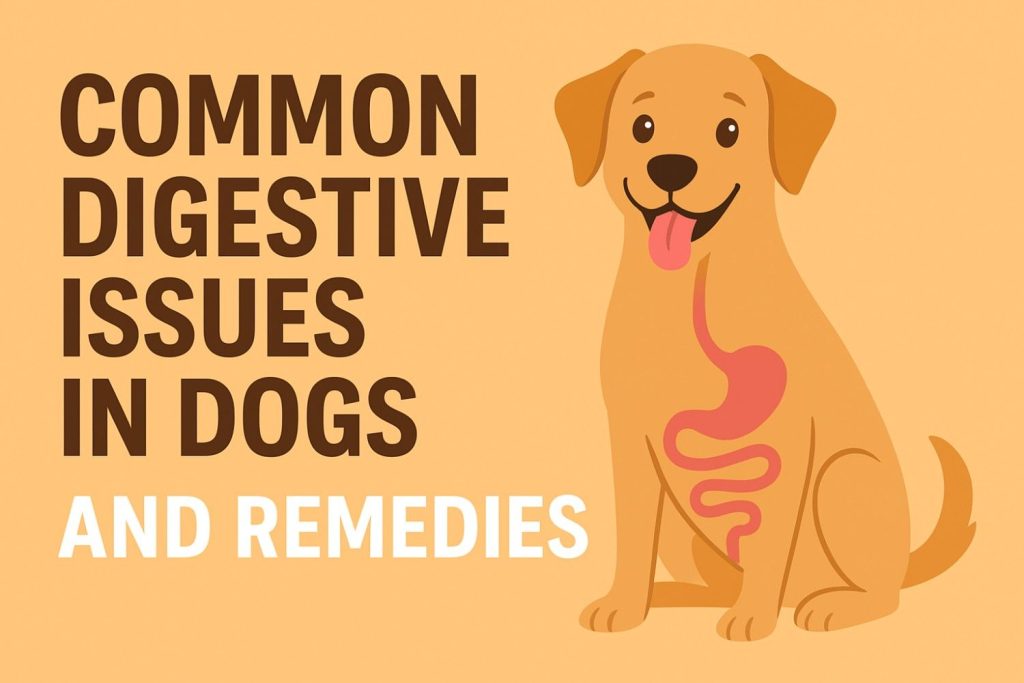🩺 Introduction: Why Digestive Health Matters
A healthy digestive system is essential for your dog’s overall well-being. It ensures proper nutrient absorption, supports immunity, and maintains energy. However, dogs often face stomach problems due to poor diet, infections, or sudden lifestyle changes. Therefore, understanding these digestive issues helps you act quickly before they become serious.

🍗 1. Diarrhea in Dogs
Diarrhea is one of the most common digestive problems in dogs. It can occur suddenly or last for several days depending on the cause. Moreover, it can be uncomfortable and dehydrating if left untreated.
Common causes include:
-
Sudden change in food or diet
-
Eating spoiled or human food
-
Bacterial or viral infections
-
Food allergies or intolerances
-
Stress or anxiety
Symptoms to watch for:
Loose or watery stools, frequent bowel movements, dehydration, tiredness, and loss of appetite.
Effective remedies:
-
Stop feeding for 12–24 hours to let the stomach rest (keep water available).
-
Feed a bland diet like boiled chicken and white rice.
-
Add plain pumpkin puree — it helps firm up stools naturally.
-
Give probiotics to restore healthy gut bacteria.
👉 If diarrhea continues beyond 48 hours or contains blood, contact your vet immediately. Early treatment prevents complications and faster dehydration.
🦴 2. Constipation in Dogs
Constipation means your dog struggles to pass stool or produces small, hard droppings. In many cases, this condition is mild but can become serious if ignored.
Possible causes:
-
Low-fiber or poor-quality diet
-
Dehydration or lack of water
-
Limited exercise
-
Hair ingestion, especially in long-haired breeds
-
Anal gland issues or intestinal blockage
Signs of constipation:
Straining during bowel movements, discomfort, bloating, and loss of appetite.
Simple remedies:
-
Add fiber-rich foods like pumpkin or sweet potato.
-
Ensure constant access to clean drinking water.
-
Encourage daily exercise to stimulate bowel movement.
-
Mix a teaspoon of olive oil in food to soften stools.
👉 If constipation lasts more than two days, see a vet for further evaluation. In addition, severe constipation might indicate an underlying blockage that requires medical attention.
🐾 3. Vomiting and Upset Stomach
Occasional vomiting can happen when dogs eat too fast or something unsuitable. However, frequent vomiting can signal deeper issues that need attention.
Main causes:
-
Eating too quickly or overeating
-
Ingesting toxic substances or foreign objects
-
Worms or parasites
-
Food intolerance or infection
-
Pancreatitis or inflammation
Common signs:
Frequent vomiting, drooling, loss of appetite, weakness, or abdominal pain.
Helpful remedies:
-
Skip one meal to allow the stomach to settle.
-
Offer small sips of water regularly.
-
Feed a bland diet (boiled chicken + rice) after resting the stomach.
-
Use dog-safe probiotics for faster gut recovery.
⚠️ If vomiting contains blood or your dog becomes dehydrated, visit a vet immediately. Moreover, persistent vomiting may lead to electrolyte imbalance.
🦠 4. Gastritis (Stomach Inflammation)
Gastritis occurs when the stomach lining becomes irritated or inflamed. This condition can develop suddenly or gradually, depending on the cause.
Common causes:
-
Spoiled or raw food
-
Eating grass or non-food items
-
Bacterial infection
-
Certain medications
Symptoms include:
Yellow bile vomiting, reduced appetite, abdominal discomfort, and weight loss.
Treatment options:
-
Give the stomach rest for 12 hours and then offer a bland meal.
-
Maintain steady water intake.
-
Use vet-recommended antacids if prescribed.
-
Add probiotics or digestive enzymes for recovery.
As a result, most dogs recover quickly once their diet and hydration are managed properly.
🌾 5. Food Allergies and Intolerances
Dogs can be allergic to common proteins or grains like beef, chicken, dairy, or wheat. Therefore, identifying and eliminating the trigger foods is crucial for long-term relief.
Signs of food intolerance:
-
Frequent vomiting or diarrhea
-
Itchy skin or ear infections
-
Gas, bloating, or poor coat condition
Remedies and prevention:
-
Try an elimination diet for 8–12 weeks.
-
Switch to hypoallergenic or limited-ingredient dog food.
-
Ask your vet for allergy tests or a prescription diet.
In addition, introducing new foods one at a time helps you identify what works best for your dog’s digestive health.
🪱 6. Intestinal Parasites
Worms and parasites like roundworms, tapeworms, or giardia can severely affect digestion, especially in puppies. Because these parasites feed off nutrients, your dog can lose weight quickly even while eating normally.
Symptoms to notice:
Diarrhea, vomiting, bloated belly, visible worms in stool, or sudden weight loss.
Effective treatments:
-
Use deworming medicine prescribed by your vet.
-
Clean up stools quickly to prevent reinfection.
-
Keep your dog’s bedding and play area disinfected.
-
Schedule regular vet checkups and fecal exams.
Furthermore, maintaining hygiene and a deworming routine protects both your pet and your home environment.
🥕 How to Maintain a Healthy Digestive System
Healthy digestion starts with daily care and good habits. Therefore, it’s important to follow these simple tips to support your dog’s gut health.
1. Feed a balanced diet.
Choose premium dog food with real meat and natural fiber. Moreover, avoid fillers like soy and corn, which can irritate your dog’s stomach.
2. Keep a consistent feeding routine.
Dogs love routine; therefore, feeding them at the same time every day helps regulate digestion and prevents overeating.
3. Provide clean water.
Hydration is essential for digestion. In addition, clean water helps prevent constipation and keeps the digestive system functioning smoothly.
4. Introduce new foods slowly.
When changing your dog’s diet, make the transition gradually over 7–10 days. Otherwise, sudden changes can cause stomach upset or diarrhea.
5. Add probiotics and supplements.
Probiotics and digestive enzymes can improve nutrient absorption. As a result, your dog’s gut bacteria stay balanced and healthy.
6. Limit treats and human food.
While sharing food may seem kind, however, it can lead to digestive issues and obesity. Instead, stick to vet-approved treats in moderation.
7. Encourage daily exercise.
Regular walks and playtime help stimulate bowel movements. Furthermore, they reduce stress-related digestion problems, keeping your dog both happy and healthy.
❤️ When to Visit the Vet
You can manage mild digestive issues at home, but sometimes professional help is essential. For example, the following signs require veterinary care:
-
Persistent vomiting or diarrhea
-
Blood in stool or vomit
-
Loss of appetite for more than a day
-
Sudden weight loss or dehydration
-
Visible worms or severe bloating
In short, quick veterinary help can prevent serious health problems and ensure faster recovery.
🐕 Conclusion: Keep Your Dog’s Tummy Happy
Your dog’s digestive health is directly linked to their energy, mood, and lifespan. Therefore, regular care, proper diet, hydration, and early treatment go a long way in preventing digestive issues.
By understanding the signs and remedies for diarrhea, constipation, vomiting, gastritis, and food allergies, you can ensure your furry friend enjoys a comfortable, healthy life. Ultimately, a strong gut means a happy dog!



